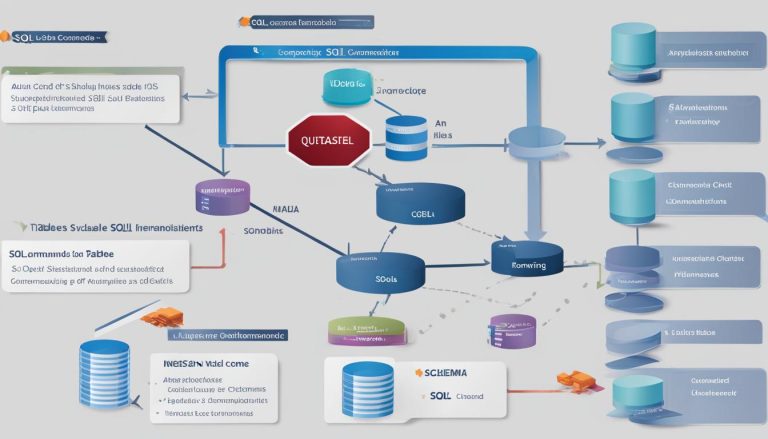Understanding Programming: What is Haskell Explained
I am excited to introduce you to the world of programming and explore the fascinating language known as Haskell. In this article, we will delve into the fundamental concepts of Haskell, its role in computer science, and its unique features that set it apart from other programming languages.
At its core, Haskell is a functional programming language that offers a fresh perspective on solving problems. It is designed to prioritize programmer productivity, code clarity, and error reduction. Haskell’s type system, lazy evaluation, and built-in memory management contribute to its appeal among developers.
Named after Haskell Brooks Curry, a renowned mathematician, Haskell draws inspiration from lambda calculus, a branch of mathematical logic. This foundation in mathematics enables Haskell to provide powerful abstractions and a smaller semantic gap between the programmer and the language.
- Haskell is a polymorphically statically typed, lazy, purely functional programming language
- It offers increased programmer productivity and clearer, more maintainable code
- Haskell’s unique features include lazy evaluation and a powerful type system
- It is suitable for a variety of applications and provides built-in memory management
- Haskell is named after Haskell Brooks Curry, a mathematician whose work influenced functional languages
Why use Haskell?
When it comes to programming projects, choosing the right language can make all the difference. Haskell, a functional programming language, offers a range of benefits that can greatly enhance your development process. Whether you’re a beginner or an experienced programmer, learning Haskell can also make you a better programmer in any language.
So why should you consider using Haskell for your projects? One of the key advantages of Haskell is its advanced features. With its strong type system and lazy evaluation, Haskell helps prevent coding mistakes and improve productivity. The language encourages a more declarative and concise coding style, allowing you to focus on the high-level logic of your programs.
Haskell’s functional nature also promotes modularity and code reuse. By using pure functions and immutable data, you can build scalable and maintainable software systems. This can lead to shorter development cycles, fewer bugs, and easier refactoring.
Table: Comparing Haskell and Imperative Programming
| Haskell | C (Imperative Programming) |
|---|---|
| Strong type system | Weaker type system |
| Lazily evaluated | Strict evaluation |
| Focus on expressions and functions | Focus on step-by-step instructions |
| Immutable data | Mutable data |
Learning Haskell can have a lasting impact on your programming skills. By exploring functional programming concepts and the Haskell ecosystem, you’ll develop a deeper understanding of programming principles and problem-solving techniques. So whether you’re looking to improve your current projects or expand your programming horizons, consider giving Haskell a try.
What is functional programming?
Functional programming is a programming paradigm that focuses on evaluating expressions rather than executing instructions. It emphasizes the use of functions as first-class values and avoids side effects and mutable state. In functional programming, the emphasis is on specifying what needs to be computed rather than how it should be computed. This approach is inspired by mathematical concepts, such as lambda calculus, which provides a foundation for functional languages like Haskell.
Functional programming can be compared to working with spreadsheets or writing SQL queries. In a spreadsheet, you define formulas that compute values based on other cells, and the spreadsheet automatically updates the values when the inputs change. Similarly, in functional programming, you define functions that compute values based on their inputs, and the results are determined solely by the inputs, without any hidden side effects or state changes.
Advantages of Functional Programming
Functional programming offers several advantages over imperative programming:
- Equational Reasoning: Functional programs are easier to reason about and debug because they are based on mathematical principles. You can replace expressions with their equivalent values, making it easier to understand and analyze the behavior of the program.
- Parallelism: Functional programs are inherently parallelizable because they avoid mutable state and side effects. This means that different parts of a functional program can be executed in parallel, leading to potential performance improvements.
- Compositional Programming: Functional programming promotes a compositional style, where programs are built by combining smaller, reusable functions. This leads to more modular and maintainable code, as functions can be easily composed and reused in different contexts.
- Wholemeal Programming: Functional programming encourages working with entire data structures as a whole, rather than focusing on individual elements. This leads to more concise and expressive code, as you can operate on complex data structures with higher-level abstractions.
Overall, functional programming provides a different approach to solving problems, with a focus on immutability, pure functions, and composability. While the paradigm may require a shift in thinking for programmers accustomed to imperative languages, the benefits it offers make it a powerful tool for building robust and maintainable software systems.
What’s Good About Functional Programming?
Functional programming offers several benefits that make it a popular choice among developers. These benefits include equational reasoning, parallelism, compositional programming, and wholemeal programming. Let’s explore each of these advantages in more detail:
Equational Reasoning
Equational reasoning is the ability to reason about code by treating expressions as mathematical equations. In functional programming, functions are pure and have no side effects, which allows for easy substitution of values and predictable behavior. This makes it easier to understand and reason about the code, and it promotes clear and maintainable code.
Parallelism
Functional programming languages, like Haskell, naturally lend themselves to parallelization. Since there are no side effects or mutable state, functions can be executed independently and in parallel without worrying about shared resources or conflicts. This can greatly improve the performance of programs that can take advantage of parallel processing.
Compositional Programming
Functional programming encourages a compositional programming style, where programs are built by combining small, reusable functions. This promotes code reuse, modularity, and maintainability. Functions can be easily composed together to create more complex behavior, allowing for a more elegant and expressive programming style.
Wholemeal Programming
In functional programming, the focus is on working with entire data structures rather than individual elements. This allows for powerful abstractions and high-level operations on data. It also leads to code that is more concise and expressive, as operations can be performed on collections of data in a single step, rather than iterating over each element.
Overall, functional programming offers several advantages that can lead to code that is easier to understand, maintain, and reason about. Equational reasoning enables clear and predictable behavior, parallelism allows for improved performance, compositional programming promotes code reuse and modularity, and wholemeal programming provides powerful abstractions. These benefits make functional programming an appealing choice for many developers.
Quicksort in Haskell vs Quicksort in C
Quicksort is a popular sorting algorithm that provides a great example of the differences between Haskell, a functional programming language, and C, an imperative programming language. The implementation of quicksort in Haskell showcases the conciseness and high-level logic that functional programming offers, while the C implementation requires detailed step-by-step instructions and mutable variables.
In Haskell, the quicksort algorithm can be implemented in just a few lines of code, thanks to the language’s focus on higher-level abstractions and declarative programming. The code emphasizes the algorithm’s core logic, making it easier to understand and reason about:
quicksort :: (Ord a) => [a] -> [a]
quicksort [] = []
quicksort (x:xs) =
let smallerSorted = quicksort [a | a biggerSorted = quicksort [a | a in smallerSorted ++ [x] ++ biggerSorted
The concise nature of the Haskell code allows the logic of the algorithm to shine through, making it easier to understand the high-level steps of the sorting process. On the other hand, the C implementation of quicksort requires a more detailed breakdown and explicit manipulation of variables:
void quicksort(int arr[], int low, int high)
{
if (low < high)
{
int pivot = partition(arr, low, high);
quicksort(arr, low, pivot – 1);
quicksort(arr, pivot + 1, high);
}
}
int partition(int arr[], int low, int high)
{
int pivot = arr[high];
int i = (low – 1);
for (int j = low; j < high; j++)
{
if (arr[j] < pivot)
{
i++;
swap(&arr[i], &arr[j]);
}
}
swap(&arr[i + 1], &arr[high]);
return (i + 1);
}
As you can see, the C code involves more low-level details, such as defining functions for partitioning and swapping elements. This level of detail can make the code more error-prone and harder to understand for developers who are not familiar with C or imperative programming concepts.
Table: Comparison of Quicksort in Haskell and C
| Aspect | Haskell | C |
|---|---|---|
| Implementation Length (Approx.) | 9 lines | 20 lines |
| Level of Abstraction | Higher | Lower |
| Focus on Algorithm Logic | Yes | No |
| Explicit Variable Manipulation | No | Yes |
| Mutability of Variables | No | Yes |
The Haskell implementation of quicksort showcases the power of functional programming and its ability to express complex algorithms concisely, with a focus on the high-level logic. Functional programming languages like Haskell encourage a more declarative and abstract approach to writing code, which can lead to clearer and more maintainable solutions. On the other hand, the C implementation requires more explicit manipulation of variables and lower-level control over the algorithm’s execution.
Overall, comparing quicksort in Haskell and C highlights the fundamental differences between functional programming and imperative programming paradigms, demonstrating the benefits of functional programming’s higher level of abstraction and declarative style.
When is C better than Haskell?
While Haskell offers many advantages, there are situations where C (an imperative programming language) may be more suitable. C is often used for low-level programming, system programming, and performance-critical applications where fine-grained control over memory and runtime behavior is important. Haskell, on the other hand, shines in situations that require modifiability, maintainability, and high-level abstractions.
C is particularly well-suited for tasks that require direct memory manipulation, such as working with hardware interfaces, implementing operating systems or device drivers, and optimizing performance-critical code. Its ability to directly access and manipulate memory gives C programmers precise control over the behavior of their programs. Additionally, C’s procedural nature makes it easier to reason about the flow of execution, which can be advantageous in complex systems.
Furthermore, C has a large ecosystem of libraries and tools that are specifically designed for systems-level programming. This makes it a popular choice for developers working on projects that require integration with existing C codebases or interaction with low-level system resources. C’s popularity in industries such as embedded systems and game development further underscores its relevance in specific domains.
Table: Situations where C is preferable to Haskell
| Situation | Reason |
|---|---|
| Low-level programming | C’s ability to directly manipulate memory and control hardware interfaces is crucial in tasks such as operating system development and device driver implementation. |
| Performance-critical applications | With fine-grained control over memory and runtime behavior, C allows developers to optimize code for maximum performance. |
| Integration with existing C codebases | C’s compatibility with other C codebases makes it an ideal choice for projects that require interaction with legacy systems or libraries. |
| Precise control over memory | Developers who require granular control over memory allocation and deallocation often choose C due to its low-level nature. |
However, it is important to note that the choice between C and Haskell ultimately depends on the specific requirements of the project and the preferences of the development team. While C may excel in certain domains, Haskell’s emphasis on modularity, type safety, and functional programming principles can bring significant benefits in terms of code maintainability, bug prevention, and rapid development. Therefore, it is essential to carefully evaluate the trade-offs and make an informed decision based on the unique needs of each project.
Does anyone use functional programming?
Functional programming, although not as widespread as imperative programming languages, is used in both industry and academia. Many companies and organizations have adopted functional programming languages like Haskell in their projects, leveraging its benefits for software development. These companies recognize the advantages of functional programming, such as clearer and more maintainable code, reduced errors, and increased productivity.
In the industry, functional programming is commonly used in domains that require high reliability and modifiability, such as finance, telecommunications, and healthcare. Haskell, in particular, has been employed in various projects, including building robust financial systems, developing artificial intelligence algorithms, and implementing data processing pipelines.
Academically, functional programming is widely taught in computer science courses and used for research purposes. Many universities and research institutions explore functional programming concepts and techniques to advance the field of computer science. Functional programming provides a solid foundation for understanding the theoretical aspects of programming languages and facilitates research in areas like programming language design and compiler construction.
Overall, functional programming has a growing presence in both industry and academia, demonstrating its relevance and value in modern software development and computer science.
Table: Industries and Academic Fields Using Functional Programming
| Industry | Applications and Use Cases |
|---|---|
| Finance | Building robust financial systems, algorithmic trading, risk management |
| Telecommunications | Developing network protocols, signal processing, optimizing network performance |
| Healthcare | Designing medical imaging software, managing patient data, analyzing healthcare data |
| Academia | Teaching functional programming courses, research in programming language design, compiler construction |
Frequently Asked Questions
As you dive into the world of functional programming and learning Haskell, you may have some common questions and concerns. Let’s take a look at a few of the frequently asked questions to address any doubts or hesitations you may have.
Is functional programming hard to learn?
Functional programming can be a new and different way of thinking for programmers accustomed to imperative programming paradigms. However, with the right resources and guidance, learning functional programming and Haskell can be an enriching and rewarding experience. Taking advantage of online tutorials, books, and online courses can provide you with the necessary foundation to grasp the concepts of functional programming and become proficient in Haskell.
Are functional programs slow?
Functional programs can be just as efficient as programs written in imperative languages, thanks to Haskell’s advanced features and optimizations. However, it’s important to note that the performance of a program is not solely dependent on the programming paradigm used but also on the implementation and algorithms employed. With proper understanding and utilization of Haskell’s features, you can write performant and efficient functional programs.
How can I integrate functional programming with existing C or C++ codebases?
Integrating functional programming with existing C or C++ codebases can be achieved through various techniques such as utilizing Haskell’s foreign function interface (FFI). The FFI allows Haskell code to interact with code written in other languages, enabling seamless integration between functional and imperative code. By leveraging the FFI, you can gradually introduce functional programming concepts and Haskell modules into your existing codebase while maintaining compatibility and functionality.
What libraries and software tools are available for Haskell?
Haskell boasts a vibrant and active community that has developed a wide range of libraries and software tools to enhance development productivity. The Haskell ecosystem includes libraries for web development, data manipulation, parsing, and much more. Popular libraries include Yesod for web development, Parsec for parsing, and lens for functional data manipulation. The Hackage website serves as a comprehensive repository for Haskell packages, allowing you to explore and find the tools that best suit your needs.
| Question | Answer |
|---|---|
| Is functional programming hard to learn? | Functional programming can be a new way of thinking, but with the right resources, it can be learned effectively. |
| Are functional programs slow? | No, functional programs can be efficient when leveraging Haskell’s advanced features and optimizations. |
| How can I integrate functional programming with existing C or C++ codebases? | Haskell’s foreign function interface (FFI) allows seamless integration with C or C++ codebases. |
| What libraries and software tools are available for Haskell? | The Haskell ecosystem offers a wide range of libraries and tools for various purposes, with Hackage as a comprehensive repository. |
How to Learn Haskell?
Learning Haskell can be a rewarding experience for programmers looking to expand their skill set and delve into the world of functional programming. Fortunately, there are numerous resources available to help you on your learning journey. Whether you prefer online tutorials, books, or online courses, there is something for everyone.
Online tutorials are a popular choice for beginners, providing step-by-step instructions and examples to help you grasp the fundamentals of Haskell. Websites like HaskellWiki and Learn You a Haskell for Great Good offer comprehensive tutorials that cover everything from basic syntax to more advanced concepts.
If you prefer a more structured approach, online courses can provide a guided learning experience. Platforms like edX and Coursera offer Haskell courses taught by experts in the field. These courses often include video lectures, quizzes, and assignments to test your understanding and ensure you’re making progress.
Books are another valuable resource for learning Haskell. Titles like Learn You a Haskell for Great Good and Real World Haskell are highly recommended for their in-depth explanations and practical examples. They cover a wide range of topics and provide a solid foundation for further exploration.

Remember, learning Haskell is a journey that requires practice and patience. As you progress, it’s important to apply what you learn by working on small projects or solving coding challenges. Engaging with online communities and forums can also be beneficial, as they provide a platform for asking questions and getting help from experienced Haskell programmers.
By using a combination of these resources and actively practicing your skills, you’ll be well on your way to mastering Haskell and unlocking the benefits of functional programming.
Conclusion
In conclusion, Haskell is a powerful functional programming language that offers numerous benefits for developers. By embracing Haskell and functional programming, you can boost your productivity and create clear and maintainable code. With its strong type system and lazy evaluation, Haskell helps you catch coding mistakes early on, leading to fewer errors and a more efficient development process.
Learning Haskell may require a shift in thinking, but it is a rewarding journey that can elevate your programming skills. By exploring functional programming concepts through Haskell, you gain valuable insights into problem-solving techniques and broaden your understanding of programming languages as a whole.
Whether you choose to incorporate Haskell into your programming projects or not, the knowledge and experience gained from learning this powerful language will benefit you in many ways. From enhanced problem-solving abilities to a deeper understanding of how programming languages work, Haskell opens doors to new possibilities and propels your career forward.
FAQ
Is functional programming hard to learn?
Functional programming can be a new and different way of thinking compared to imperative programming, but with practice and dedication, it can be learned and mastered.
Are functional programs slow?
Functional programs can be optimized for performance just like imperative programs. In fact, functional programming’s focus on immutability and purity can make it easier to reason about and optimize for performance in certain situations.
How can I integrate functional programming with existing C or C++ codebases?
Functional programming concepts and techniques can be applied in any programming language, including C or C++. It may require some modifications to your codebase and adopting functional programming practices gradually.
What libraries and software tools are available for Haskell?
Haskell has a rich ecosystem of libraries and software tools that cover various domains and use cases. Some popular libraries include “GHC” (the Haskell compiler), “Haskell Platform” (a collection of useful libraries), and “Stack” (a build tool for Haskell projects).
Where can I find help and resources for learning Haskell?
There are many online tutorials, books, and courses available for learning Haskell. Online communities and forums, such as the Haskell subreddit and the Haskell community on Stack Overflow, are also great resources for getting help and advice from experienced Haskell programmers.
- About the Author
- Latest Posts
Claudia Rothenhorst ist Medien- und Reise-Redakteurin bei der Web-Redaktion. In ihrer Freizeit reist sie gerne und schreibt darüber unter anderem auf Reisemagazin.biz.
Weitere Artikel von Ihr erscheinen u.a. im Blog der Webagentur Awantego.






